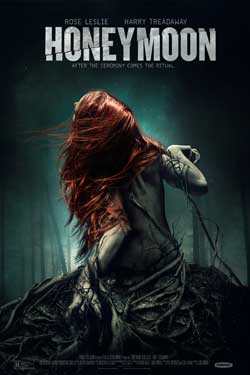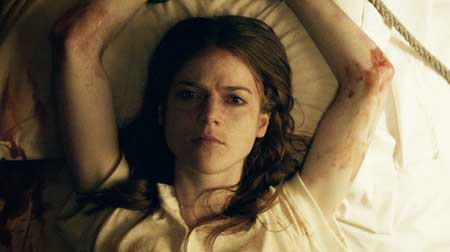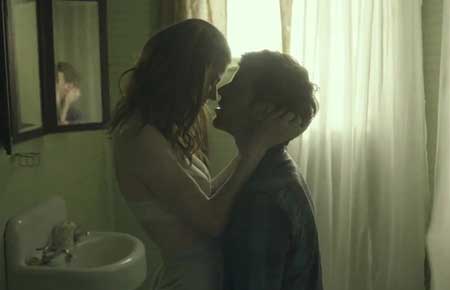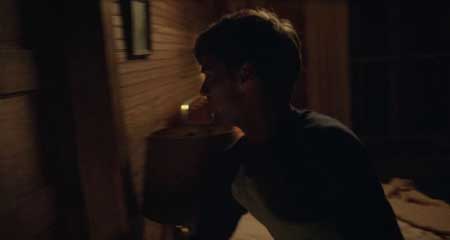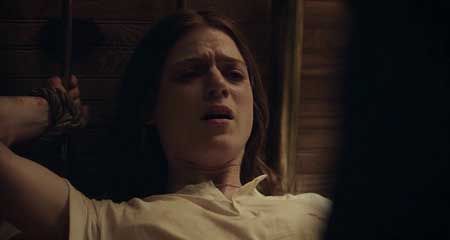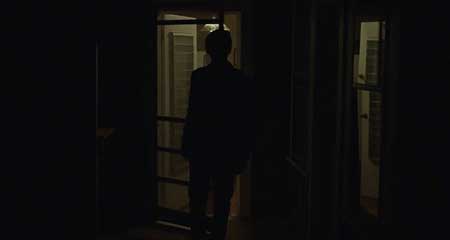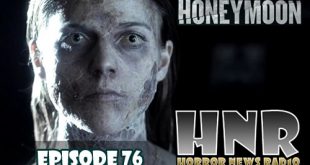SYNOPSIS:
A newlywed couple finds their lake-country honeymoon descend into chaos after Paul finds Bea wandering and disoriented in the middle of their first night.
REVIEW:
How well does one truly know a significant other? Is the length of a courtship through engagement and the exchanging of vows an ample amount of time to base the remainder of one’s existence upon? Worth noting in this discussion is the fact that most married couples, happy or otherwise, will confess without a hint of irony that things indeed change after the wedding. If the essential dynamic of a relationship is transformed by the utterance of two tiny words, was all that occurred prior merely the product of a giant floating head in front of a curtain?
Thankfully, we have horror movies to tackle these deep sociological issues, friends. Kidding aside, one can’t deny the larger questions lurking beneath the simple surface of director Leigh Janiak’s freshman effort, “Honeymoon.” A modest venture into “Invasion of the Body Snatchers” territory, our latest transcends premise to find its own distinctive, unsettling voice. This one’s a quiet corker.
If you can choke down the first half hour, that is. We meet newlyweds Bea (Rose Leslie from “Game of Thrones”) and Paul (Harry Treadaway, Victor Frankenstein in “Penny Dreadful”) as they arrive at her family’s secluded lakefront cottage fresh from their nuptials. Giddy with joy and unable to physically separate for longer than eighteen seconds, these initial moments could force even the most ardent admirer of romcoms to fight back bile. Fear not, for the sequences serve as a calculated maneuver by Janiak and co-writer Phil Graziadei, offering subtle insights beyond the obvious particulars of how disgustingly in love the couple is.
The night following an uncomfortable reunion with a teen crush while buying supplies, Bea pulls a brief disappearing act and is found in the woods, naked and completely unaware of how she’d arrived there. The episode is dismissed as sleepwalking, but Heather McIntosh’s brilliantly brooding score and the immediate concern in Paul’s eyes beg to differ. That morning, she has forgotten how to make French toast or even a pot of coffee. It isn’t long before she’s rehearsing excuses for withholding sex in a mirror and absently referring to her suitcase as the “clothes box.”
It would classify as spoiler material to state that who or what Paul brought back from the forest isn’t exactly his new bride if “Honeymoon” didn’t shrewdly narrow focus to exclude other possibilities. It could have easily played the “Is it all in his head?” card and catered to a thematic wild goose chase, but instead concentrates on Bea’s increasingly strange behavior and Paul’s slow realization that he is facing an unfathomable possibility. Bright lights and shadowy figures lurking amongst the trees at the exact same time each night strengthen his suspicions.
Upon discovering Bea attempting a do-it-yourself abortion in the bathroom, Paul ties her to the bed and demands answers. The interrogation is an emotional heartbreaker, as he quizzes her on general shared knowledge and tearfully pleads “Where is my wife?” when she fails the test. Her insistence on identity is betrayed by what can only be described as a Cronenberg remaking “Eraserhead” scenario. In the few fleeting instances that require the presence of blood, “Honeymoon” doesn’t skimp on the ick factor.
The driving force that keeps proceedings popping even through the schmaltzy opening minutes is the combination of two outstanding leads. Treadaway walks the fine line between denial and despair as Paul, sidestepping histrionics to cut a nuanced and ultimately tragic figure. The far trickier role of Bea, however, is completely owned by Leslie’s revelatory turn. In the best performance I’ve witnessed thus far this aged year, the frustration and barely concealed confusion that surely would accompany a waning humanity are expressed beautifully, fortifying Paul’s (and our) hope that some semblance of Bea still exists within. Long story short, she’s incredible here. Deserving of kudos as well are their grasps of the American dialect (she’s a Scot, he’s English), peppered with that amiable twang most thespians of the United Kingdom spend decades striving to lose yet rarely do unless they’re Gary Oldman.
It’s surprising that Janiak doesn’t have so much as a short subject to her credit, given the level of maturity present in her script and direction. She must have really been paying attention during the productions in which she served as an assistant. So many budding auteurs have impressed with debuts in the past couple of years (Jeremy Gardner, Astron 6 and the Soskas to scrape the surface), keeping track of them all has grown cumbersome. Hers is a name I’ll not soon forget and be looking out for in the future.
Though the murky resolution will likely disappoint some and baffle others, “Honeymoon” is the breed of motion picture that could never possibly satisfy everyone in its outcome. Incorporate too much explanation, you run the risk of convoluting the entire endeavor. Leave it wide open, you’re bound to be met with a divergent cry for closure. My assessment is usually dependent on whether or not the ending is indicative of what has come before. In this case, it is.
As for the veiled ruminations on commitment and intimacy, I’ll leave interpretations to you, friends. At face value, “Honeymoon” is an exceptional and haunting piece of work, which is good enough for yours truly. See it with someone you think you know. . .
 Horror News | HNN Official Site | Horror Movies,Trailers, Reviews
Horror News | HNN Official Site | Horror Movies,Trailers, Reviews
